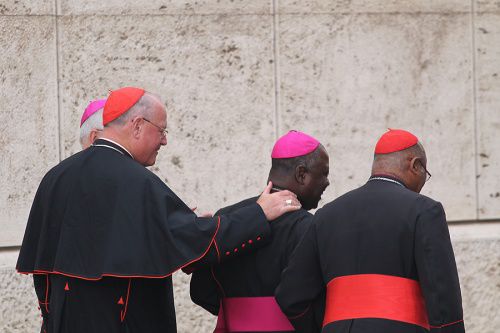The Synod of Bishops announced Tuesday it had released its prepatory document for the 2015 Synod on the Family, asking that bishops avoid formulating pastoral care merely in terms based on doctrine. The Dec. 9 document, known as a “lineamenta”, is composed of the concluding report from the 2014 synod, as well as a series of 46 questions to be delivered to bishops conferences, Eastern Catholic synods, religious superiors, and dicasteries, as well as academic institutions and ecclesial movements. “The questions posed here, which refer to first part of the synod's final report,” the introduction to the first part of the questionnaire says, “are intended to assist the bishops' conferences in their reflection and to avoid, in their responses, a formulation of pastoral care based simply on an application of doctrine.” This, the synod secretariat suggested, “would not respect the conclusions of the Extraordinary Synodal Assembly and would lead their reflection far from the path already indicated.” The lineamenta is currently in Italian, but will soon be translated into other languages. Responses to the questions must be returned to the synod's secretariat by April 15, 2015, so that the working guideline for the autumn synod, set for Oct. 4-25, can be published in a timely manner. The questionnaire is divided into three parts: “Listening: the context and challenges of family”; “The gaze set on Christ: the Gospel of the family”; and “The Confrontation: pastoral perspectives.” The first, introductory, and comprehensive question is: “Does the description of the reality of family presented by the Synod’s final report corresponds to what is experienced in the Church and in today’s society? Are there missing aspects, and how can they eventually be implemented in the report?” The questions, and the introductions to each part of the questionnaire, reveal that for the secretariat of the Synod of Bishops, pastoral care is the primary goal. The introduction of the third part of the questionnaire states that “it is important to be driven by the pastoral approach that the Extraordinary Synod began, which is grounded in the Second Vatican Council and in Pope Francis' Magisterium.” Bishops conferences “are entrusted with continuing to examine” the pastoral approach, “involving, in the most opportune way, all levels of the local Church, thus providing concrete instances in their specific contexts.” The lineamenta adds that “efforts should be made not to start again from zero, but to continue the path taken by the extraordinary synod as a starting point.” The questions also deal with some of the most controversial discussions that took place during the 2014 synod, including pastoral care for homosexual persons and for the divorced and remarried. The document stressed mercy for injured and fragile families, and underscored that the synod fathers “courageously and openly” addressed the issue of the Church’s approach toward “Catholics who are bound by an only civil bound; who still cohabitate; and who, after a valid marriage, have divorced and civilly remarried.” One of its questions asks, “How to help to understand that no one is excluded by the God’s mercy and how to express this truth in the Church’s pastoral action toward families, in particular the injured and fragile ones?” And what are “the criteria for a correct pastoral discerning of each situation,” which “must be considered in light of the Church’s teaching, that marriage is characterized by unity, indissolubility, and openness to children?” It also asks what “possible steps” there are regarding “pastoral and sacramental care” for the divorced and remarried. “What suggestions are there for eliminating types of impediments that aren't warranted or necessary?” Regarding care for homosexuals, “How can the Christian community direct its pastoral attention to families with persons with a homosexual tendency? Avoiding any unjust discrimination, how can it take care of people in these situations in the light of the Gospel? How can the demands of God's will in their situation be proposed?” On the basis of the responses to these questions, the general secretariat of the Synod of the Bishops will issue a working document. Starting from this latter, the synod fathers will open their discussion at the 2015 ordinary synod.

